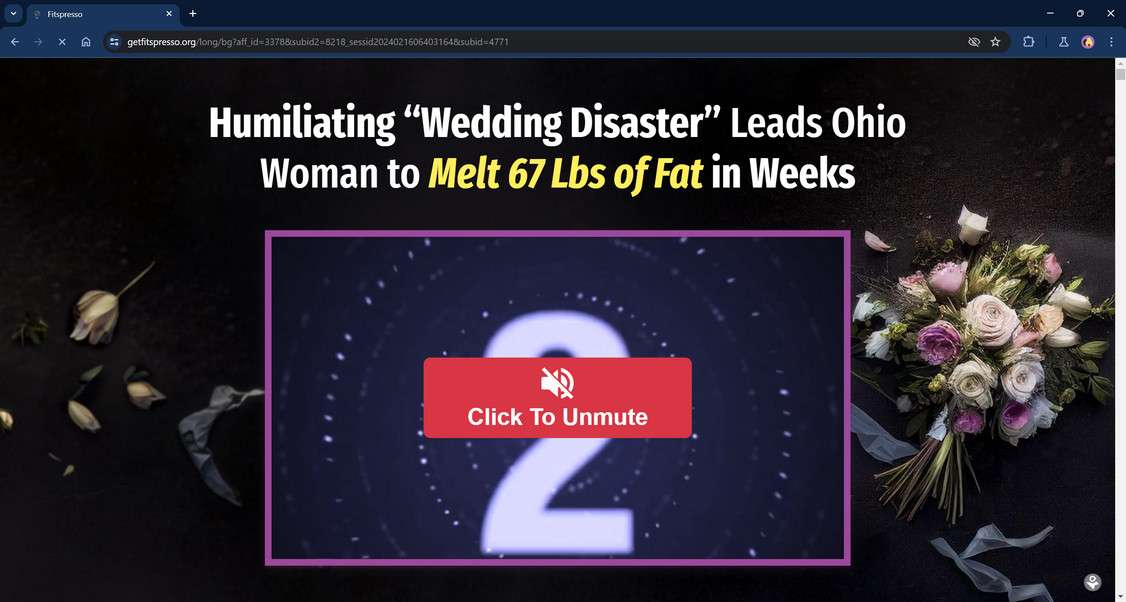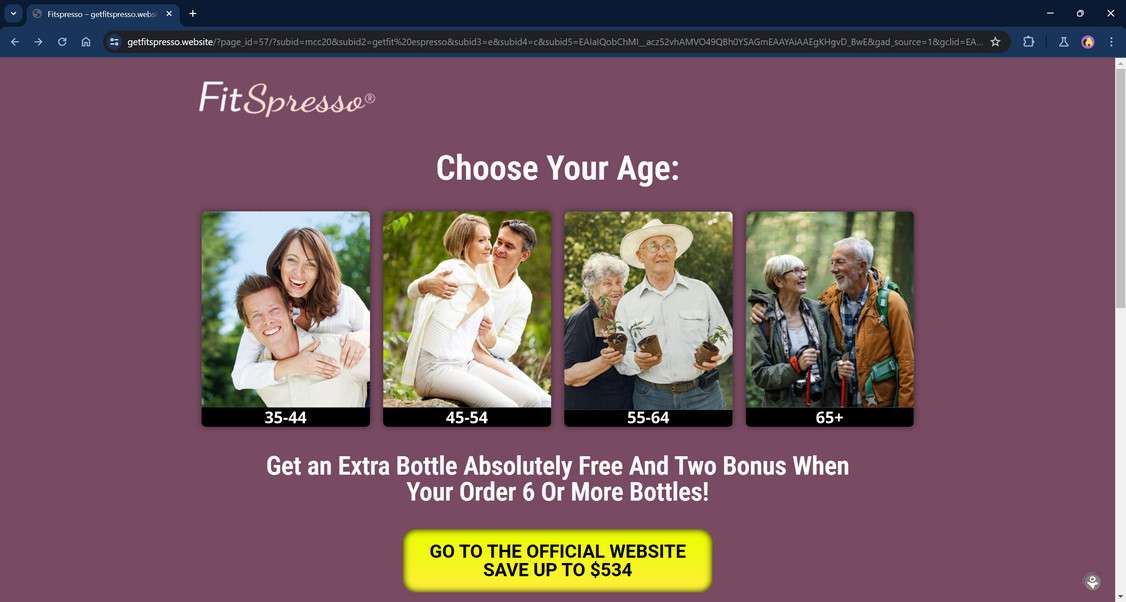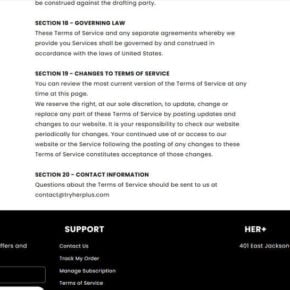The internet is filled with dubious weight loss products making bold claims not supported by science. One such product, FitSpresso, markets itself as a “coffee loophole” for easy weight loss. However, behind the hype FitSpresso appears to be an ineffective supplement scam using exaggerated claims, fake celebrity endorsements, and deceptive tactics to promote an unproven product. This article explores how the FitSpresso scam works and provides advice for those who may have fallen victim to protect themselves and their wallets.


Overview of the FitSpresso Scam
FitSpresso is a weight loss supplement that has been heavily marketed online as a “coffee loophole” or “Mediterranean ritual” that can help you lose significant weight quickly and easily. However, behind the hype, FitSpresso appears to be an ineffective supplement backed by false claims and what seems to be a scam.
The FitSpresso website and advertisements make many dubious claims about the supplement’s effectiveness for weight loss. They say it’s “backed by multiple peer-reviewed studies” and has been “approved by the FDA.” However, there is no evidence that FitSpresso has ever been independently studied, let alone approved by the FDA or any other regulatory body.
In reality, FitSpresso seems to be taking advantage of the hype around natural weight loss remedies and coffee’s popularity to sell an overpriced supplement using exaggerated claims not supported by any research.
Overview of Why FitSpresso is Considered a Scam:
- Uses fake testimonials and misleading celebrity endorsements to appear credible
- Makes unsupported health claims not evaluated by the FDA
- Relies on a long, manipulative sales pitch full of pseudoscience
- Refund process is difficult and designed to deter buyers
- Product is not clinically tested and no research supports its claims
- Uses shady marketing tactics like fake limited-time discounts
- Many customers report no weight loss from using the product
- Company behind it is unknown and untraceable
Let’s take a closer look at how the FitSpresso scam works and why you should avoid this dubious weight loss supplement.
How the FitSpresso Scam Works
The marketers behind FitSpresso have employed many of the typical tactics used by scams and false weight loss products to make it appear credible and convince customers to buy it.
1. Fake Celebrity Endorsements and Testimonials
The sales videos feature supposed quotes from celebrities like Drew Barrymore, Wendy Williams, and Miranda Lambert claiming they lost significant weight using FitSpresso. However, these are fake testimonials using edited footage and voiceovers. None of the depicted celebrities have endorsed or recommended FitSpresso.
Similarly, the website shows many before/after photos and dramatic weight loss testimonials from “ordinary people” as well. But these are likely stolen stock photos or paid actors, not real FitSpresso customers.
2. Misleading Claims of FDA Approval and Clinical Studies
The FitSpresso website and sales pitch repeatedly claim that the supplement has been “evaluated by the FDA” and “backed by clinical studies.” This is false – FitSpresso has not been approved or evaluated by the FDA, and there’s no evidence it was clinically tested.
3. Long, Manipulative Sales Pitch Video
Potential customers are subjected to an extremely long, rambling sales pitch video full of pseudoscience claims, logical leaps, and high-pressure tactics to buy FitSpresso. This video seems engineered to overwhelm critical thinking and make people feel compelled to buy the product.
4. Auto-Billing Scam and Difficult Refund Process
Buried in the terms is an auto-billing clause that signs you up for monthly shipments of FitSpresso without your consent. Many customers report being scammed by this. The refund process is also difficult and designed to deter you from getting money back.
5. Shady “Limited Time” Pricing Tricks
The website claims prices will drastically rise and products will sell out to create false scarcity. In reality, the “limited time” discounts have been ongoing for months, and FitSpresso never seems to sell out.
6. Unknown Company Behind It
There is no verifiable information about what company manufactures or markets FitSpresso. The address on the bottle leads to an unrelated freight company.
With no real clinical tests, FDA approval, or transparent sourcing, there’s no reason to think FitSpresso actually provides the claimed benefits. At best, it seems to be an overpriced caffeine pill.
Explanation of How the FitSpresso Scam Works
Here is a closer look at each step of how the FitSpresso weight loss scam operates:
1. Fake News-Style “Review” Articles
Google searches for “FitSpresso reviews” turn up many fake “news” articles on sketchy blogs raving about it. These mimic real news reports but are designed to lure visitors.
2. High-Pressure Sales Video
Visitors are taken to a lengthy sales pitch video combining pseudoscience claims, manipulative language, fake testimonials, and frequent calls to act now.
3. False Claims of FDA Approval and Clinical Studies
The sales pitch repeatedly claims FitSpresso is “approved by the FDA” and “clinically proven” to cause substantial weight loss. This is completely false.
4. Misleading Celebrity Endorsements
Fake endorsements from celebrities like Miranda Lambert and Wendy Williams are used to make FitSpresso seem credible.
5. Dubious Limited Time Offers
Pressure to buy is created through fake limited-time discounts and claims that supplies are running out. In reality, the “discounts” are ongoing.
6. Burying of Auto-Billing and Refund Policy
The terms state you’ll be auto-billed for monthly shipments of FitSpresso. The refund policy makes it very difficult to cancel or get your money back.
7. No Transparent Company Information
There are no verifiable details about what company sells FitSpresso or where it’s manufactured. The listed address is for an unrelated freight company.
8. Failure to Deliver Promised Weight Loss Results
Many customer reviews state FitSpresso did nothing for their weight despite the bold claims made. It likely contains only caffeine and no special weight-loss ingredients.
In summary, FitSpresso exhibits many red flags: wild claims without proof, fake testimonials, exaggerated celebrity endorsements, phony limited offers, auto-billing scams, and no transparency. There’s no reason to think it provides any of the claimed benefits.
What to Do If You Fell Victim to the FitSpresso Scam
If you already ordered FitSpresso and suspect you may have been scammed, here are some steps to take:
1. Request a Refund Immediately
Contact FitSpresso customer support right away to begin the refund process. Do this within 30 days of purchase if possible, as the window may be limited.
2. Dispute the Charges
If refund requests are denied, report the fraudulent charges to your credit card company or bank. Provide evidence the product did not work as advertised.
3. Cancel Any Recurring Payments
If you were signed up for monthly auto-shipments without consent, instruct your bank to block any further FitSpresso payments.
4. File Complaints
Submit complaints to the BBB, FTC, and FDA detailing the deceptive marketing practices and false claims made about FitSpresso.
5. Warn Others
Post honest reviews about your experience to warn others away from the FitSpresso weight loss scam. Focus on factual problems like lack of results, auto-billing scams, and dishonest marketing tactics.
6. Request Chargeback from Your Credit Card Company
Under the Fair Credit Billing Act, you can request a chargeback on credit card purchases of defective or misrepresented products. Explain why you feel FitSpresso was a scam.
7. Consult Your Bank
If you used a debit card, contact your bank to ask about fraud protections that may cover a purchase like this. Provide documentation of the scam and failed refund efforts.
8. Report FitSpresso to the FTC
File an official complaint with the Federal Trade Commission regarding the deceptive marketing practices and scam tactics used by FitSpresso at www.ftccomplaintassistant.gov.
9. Contact Local Authorities
Some jurisdictions allow you to report fraudulent companies to local law enforcement or consumer protection agencies who may investigate the scam.
10. Learn from This Experience
Be more cautious of similar “miracle” weight loss products promoted online in the future. Rely on trustworthy sources like doctors for health advice.
Frequently Asked Questions about the FitSpresso Scam
1. Is FitSpresso approved by the FDA?
No, FitSpresso is not approved by the Food and Drug Administration (FDA). The company falsely claims in its advertising that FitSpresso is “evaluated by the FDA”, however there is no evidence of any evaluation or approval. The FDA does not approve dietary supplements like FitSpresso before they can be sold.
2. Has FitSpresso been clinically tested?
There is no evidence that FitSpresso has undergone any legitimate clinical trials or been scientifically tested. The company provides no verifiable proof of testing, merely claiming it is “clinically proven”. There are no peer-reviewed studies backing the product’s weight loss claims.
3. Are the celebrity endorsements real?
No, the endorsements from celebrities like Miranda Lambert, Wendy Williams, and Drew Barrymore featured in FitSpresso’s ads are fake. The videos use edited footage and voiceovers to mislead consumers. None of these celebrities have publicly endorsed or recommended FitSpresso.
4. Are the customer reviews and testimonials real?
Many of the glowing customer reviews, dramatic before/after photos, and weight loss testimonials used in FitSpresso’s marketing are likely fabricated. They utilize stock photos or paid actors, not real customers. There are no verifiable reviews confirming these exceptional weight loss claims.
5. Is there a money-back guarantee?
While FitSpresso claims a money-back guarantee, the refund process is purposefully difficult and designed to deter buyers from actually getting their money back. Many report being unable to get a refund successfully after trying the product and not losing weight.
6. Who makes and sells FitSpresso?
There is no transparent information about the company behind FitSpresso. The listed address leads to an unrelated freight company, not the manufacturer. There are no verifiable details about who actually makes or markets the product.
7. Where can I report the FitSpresso scam?
You can file official complaints about FitSpresso’s deceptive marketing practices with the Federal Trade Commission (FTC), Food and Drug Administration (FDA), and Better Business Bureau (BBB). This may help warn others and stop their false advertising.
8. How can I get my money back if I fell for the scam?
First, request a refund immediately. If that fails, dispute the charges with your credit card company. You can also request a chargeback due to failure to deliver promised results. Submit evidence of the scam and misleading claims.
9. Are there other legal options if FitSpresso refuses a refund?
Yes, you may be able to take legal action depending on where you live and the amount of money lost. Consult a consumer protection attorney about potentially filing lawsuits against companies running scams like FitSpresso.
10. How can I spot similar scams in the future?
Beware of outlandish weight loss claims, fake celebrity endorsements, alleged FDA approval, paid customer reviews, no clinical trials, and too-good-to-be-true offers. Rely on medical sources like your doctor, not internet ads, for health products.
The Bottom Line on the FitSpresso Scam
FitSpresso exhibits many of the typical warning signs of a weight loss scam, including exaggerated claims not backed by science, fake celebrity endorsements and reviews, auto-billing scams, and no transparency about the company behind it.
There is no evidence that FitSpresso pills produce significant weight loss or have been clinically tested at all. The company uses lengthy, manipulative sales pitches full of pseudoscience and false claims to convince customers to buy their likely ineffective product.
If you purchased FitSpresso but failed to lose weight as drastically promised, take action to get a refund and report the company for running a scam. Going forward, be very wary of similar products promoted online using dubious strategies and miracles claims not supported by reliable research.
To summarize, FitSpresso appears to be a weight loss scam making false promises, exaggerated claims not backed by any studies, and using various deception tactics to sell an ineffective or potentially dangerous product. All signs point to it being a fraud.
There is no scientifically proven “coffee loophole” or “Mediterranean ritual” for losing weight rapidly. Claims that FitSpresso pills provide substantial weight loss benefits are unsubstantiated and almost certainly false based on a lack of transparency and testing.
Weight loss is always best achieved through legitimate methods like improved nutrition, exercise, and the guidance of medical professionals – not internet scams promising effortless results. Avoid FitSpresso and protect yourself by reporting it if you were victimized.
This article is for informational purposes only and should not be relied upon for financial or business decisions. We identify potential scams using research, user experiences, and expert analysis. However, all claims should be independently verified. Mistakes may occur, and legitimate products could be flagged. We strive for accuracy but make no warranties regarding the completeness or reliability of the information.
If you are the owner of the website or product in question and wish to offer clarifications regarding your business or website, please reach out to us via our Contact form.

